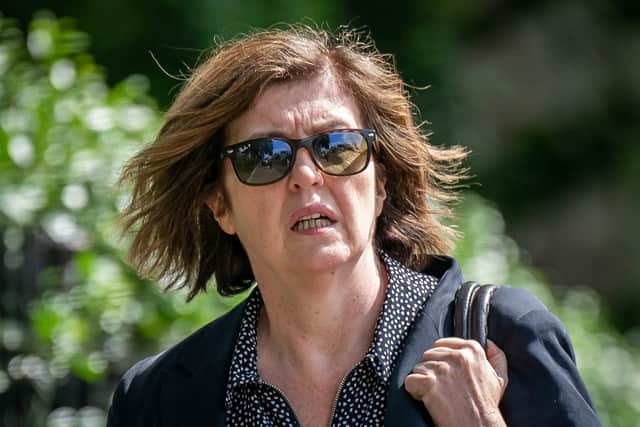Partygate inquiry: evidence Boris Johnson misled MPs over Covid rule breaches - what did report say?
and live on Freeview channel 276
Breaches of coronavirus rules during Partygate would have been “obvious” to then-Prime Minister Boris Johnson, according to the inquiry into whether he misled Parliament over the scandal.
The cross-party Privileges Committee has said there is evidence that Johnson misled the House of Commons multiple times when he repeatedly claimed that no lockdown rules had been broken at Downing Street. The committee has cited a series of remarks made by Johnson as proof of their claim - with one of the most damning examples being when the MP remarked he was at “probably the most unsocially distanced gathering in the UK”, during a mid-pandemic leaving party.
Advertisement
Hide AdAdvertisement
Hide AdEvidence also included messages between a Number 10 official and Downing Street’s then-communications director Jack Doyle, where the pair discussed the birthday gathering held for Johnson in 2020. The former Prime Minister was ultimately fined for his attendance at the occasion.
Mr Doyle wrote: “I’m struggling to come up with a way this one is in the rules in my head.” Then, in response to a suggestion that they describe the event as “reasonably necessary for work purposes”, he said: “Not sure that one works, does it? Also blows another great gaping hole in the PM’s account, doesn’t it?’”
Meanwhile, the Number 10 official remarked in a separate exchange that a colleague was “worried about leaks of PM having a piss-up, and to be fair, I don’t think it’s unwarranted”.


The Privileges Committee said: “The evidence strongly suggests that breaches of guidance would have been obvious to Mr Johnson at the time he was at the gatherings. There is also evidence that those who were advising Mr Johnson about what to say to the press and in the House were themselves struggling to contend that some gatherings were within the rules.”
Advertisement
Hide AdAdvertisement
Hide AdIt then points to Johnson’s failure to tell the House about his own knowledge of the gatherings during which rules or guidance had been broken, remarking: “It appears that Mr Johnson did not correct the statements that he repeatedly made and did not use the well-established procedures of the House to correct something that is wrong at the earliest opportunity.”
The inquiry’s interim report has come ahead of when the Uxbridge MP will be cross-examined on his own evidence on the scandal during a televised live broadcast, due to take place in the week beginning 20 March. It makes clear that this is not a “final conclusion”, which will probably not be reached for months.
What has Boris Johnson said?
Johnson has responded to the report, but despite its seemingly damning initial findings, has claimed he has been “vindicated”. He said: “I believe that their labours have helped establish the obvious truth. It is clear from this report that I have not committed any contempt of Parliament.
“It is also clear that what I have been saying about this matter from the beginning has been vindicated. That is because there is no evidence in the report that I knowingly or recklessly misled Parliament, or that I failed to update Parliament in a timely manner.”
Advertisement
Hide AdAdvertisement
Hide AdHe added that he “relied upon advice from officials” so when he told MPs “that the rules and the guidance had been followed, that was my honest belief”.


It comes as a growing number of Tory MPs have expressed their outrage at the news that senior civil servant Sue Gray – who led a separate investigation into Partygate – has left the Cabinet Office to become chief of staff in the Labour Party. Jacob Rees-Mogg, who has long been a staunch ally of Johnson, said: “So much for an impartial Civil Service. The [Sue] Gray report now looks like a left wing stitch up against a Tory Prime Minister.”
Johnson also raised concerns, commenting: “I leave it to others to decide how much confidence may now be placed in her inquiry and in the reports that she produced.” He also said it is “surreal” and “particularly concerning” to discover the Privileges Committee was partially relying on findings from Ms Gray, but the committee defended its inquiry as being “not based on the Sue Gray report” - and instead on evidence including witnesses, WhatsApps, emails, and photographs.
The cross-party committee, which will comprise of four Conservatives, two Labour, and one SNP MP, also stated that Johnson has told them he has “no relevant material” to offer after repeated requests for evidence. “He still has not provided us with a written submission,” they said.
Comment Guidelines
National World encourages reader discussion on our stories. User feedback, insights and back-and-forth exchanges add a rich layer of context to reporting. Please review our Community Guidelines before commenting.
